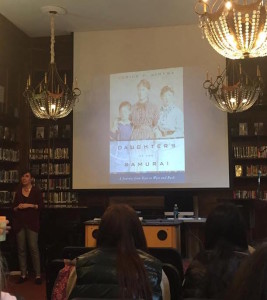On November 10th, the Class of 2018 welcomed author Janice Nimura to Hewitt. Her visit included a presentation about her book, Daughters of the Samurai, which has received critical acclaim. The novel is based on the true story of Sutematsu, Shige, and Ume; three Japanese girls who, in 1871, were sent by the Japanese government to travel to America to learn about the western world.
It was the first time any Japanese girl had gone to America. The three girls were to live there for 10 years, and then return to Japan. The girls were very young with their ages varying from 7-14 years old. The exposure to westernization was unprecedented for women in Japan. While in America, Shige and Sutematsu attended Vassar. Meanwhile, the youngest one, Ume, graduated high school.
The interesting tale of the girls’ journey was rediscovered by Nimura. She lived in Tokyo for 3 years with her husband, where she absorbed Japanese culture. She furthered her education on Japanese culture by majoring in East-Asian studies in college.
Nimura’s discovery of the girls’ story began when she came across a book by Alice Bacon, A Japanese Interior, at the New York Historical Library. Nimura began her investigation into Alice Bacon’s life and learned that Sutematsu was Bacon’s foster sister. This prompted Nimura to research the story of the three girls even further.
“Gathering information was the fun part; the writing was much harder,” Nimura said. She told Hewitt’s Class of 2018 accounts of her investigation, such as coming in contact with the great-great-great granddaughter of Alice Bacon. “There was a lot of letter finding, going to Rutgers, and Vassar visits,” Nimura explained.

The novel also revealed the culture shock that occurred for the three girls. Ume was sent to Washington D.C., whereas Sutematsu and Shige lived in New Haven, CT. Over time, Ume lost her Japanese heritage completely. She could no longer read, write, or speak Japanese. Sutematsu and Shige held on to some of their culture since they were relatively close to each other and had a bond. They continued speaking Japanese but lost the ability to read and write the language.
The 10th grade is studying United States history this year, and they were enraptured by Nimura’s talk. “I thought it was really interesting to hear the girls’ story and listen to how she gathered all the information,” said Carly Spilker’ 18. “I would love to have another author to visit us and talk about their writing process and inspirations, just like Nimura some time.”